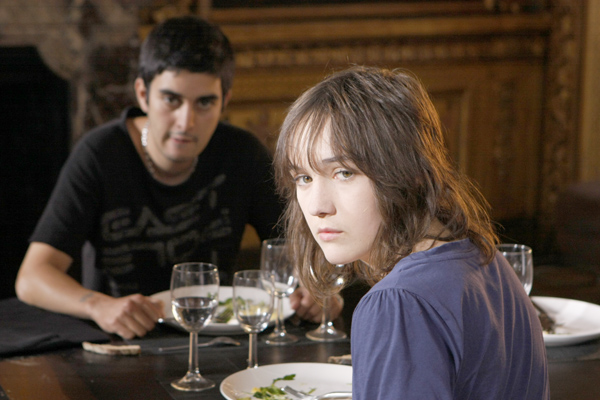|
Reviews of Recent Independent, Foreign, & Documentary Films in Theaters and DVD/Home Video

HADEWIJCH
Morrissey and Dumont are not the first to wrestle with the dilemma. It’s a bit startling to me, though, to encounter this notion in modern culture when I wrongly assume we’re well beyond any “How many angels can dance on the head of a pin?” theological debates. Religious scholarship is an anachronism in my own life, and I quite appreciate when a current filmmaker or another artist reminds me of what trials the world’s billions of faithful weather each day. Knowing his post-religious audience, Dumont is always diligent at infusing the story with the details of modern life, regardless of the time-honored themes (the school itself is probably named for Hadewijch of Antwerp, a 13th-century poet and mystic). With a construction crew working outside Céline’s convent window as she prays, and even in the stitching of her designer jeans, we never feel too far from the present day. Similar films come to mind, but it’s rare for this particular material to make as much sense in a contemporary setting. Peter Weir’s Picnic at Hanging Rock (1975), for instance, understands the passions of sheltered teenage girls, but he avoids the modern era altogether, while Jessica Hausner’s Lourdes (2009) takes a cynical, far less sympathetic, attitude toward religious devotion. Dumont takes a risk here as well. Céline, finding herself back in Paris, befriends a group of young Muslim devotees and easily buys into their almost hip brand of fanaticism. It’s not such a far reach from Catholic devotion. Their discussions of violence and martyrdom in the name of God only fuel her own extremist fantasies and actually appear to her as a direct sign from Him. Dumont slowly allows us, along with Céline, access to what’s eventually revealed as a terrorist cell—an ideological one, at least—and without warning we’re in the thick of the kind of faith that weekly makes headlines. Dumont’s comparison sneaks up on us, and is it ever effective. He takes no moral stance—he’s saying only that the similarities between Christian and Muslim devotion (and fanatic devotion to anything, really) are a lot closer than most of us are probably willing to accept. It’s hard
to decide what the passions Céline actually experiences are. At first,
it feels like love, yet as soon as violence is involved, her
emotional state becomes murky. It’s a symptom of the conflict between
human instinct and spiritual rationalization, for lack of better terms.
The emotional cues offered up in modern life are far from
straightforward, and the everyday is not an easy negotiation for
Céline—or for that matter, anyone without a stable belief system in
place that can reconcile heaven and earth. I suppose it’s safe to say
Céline may be a unique character and a fanatic, sure, but her problems
are probably not too far from our own.
Michael Lee
|

